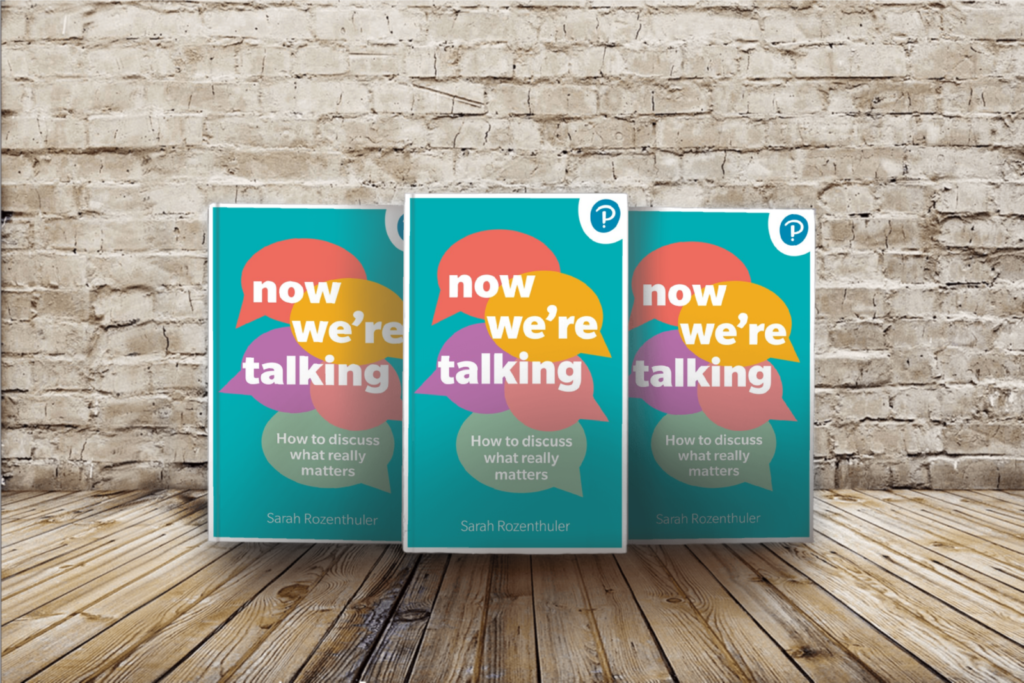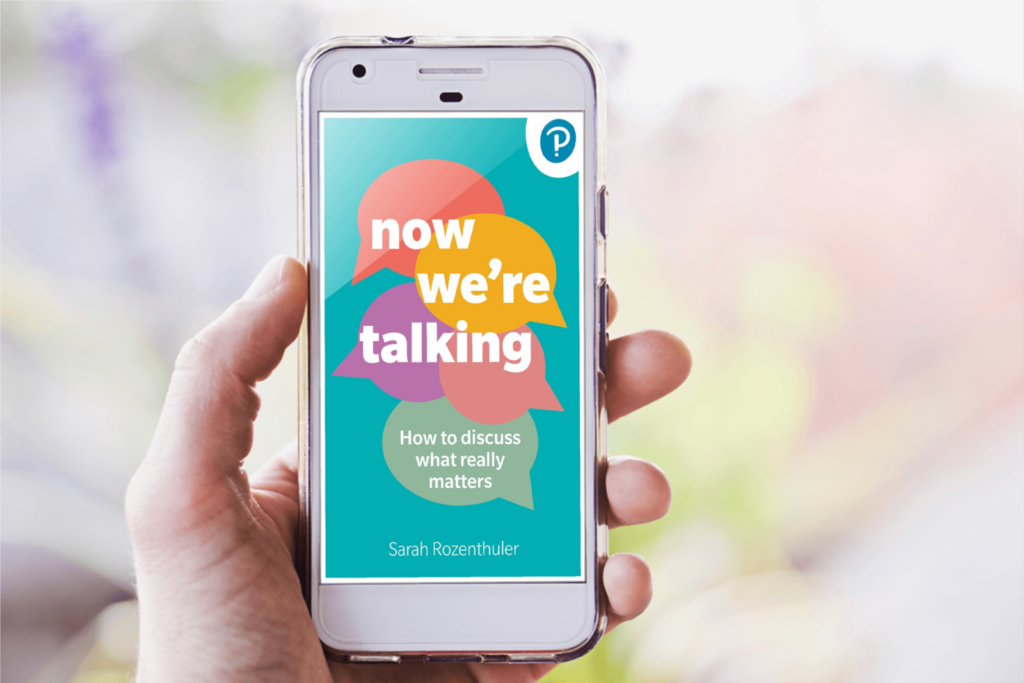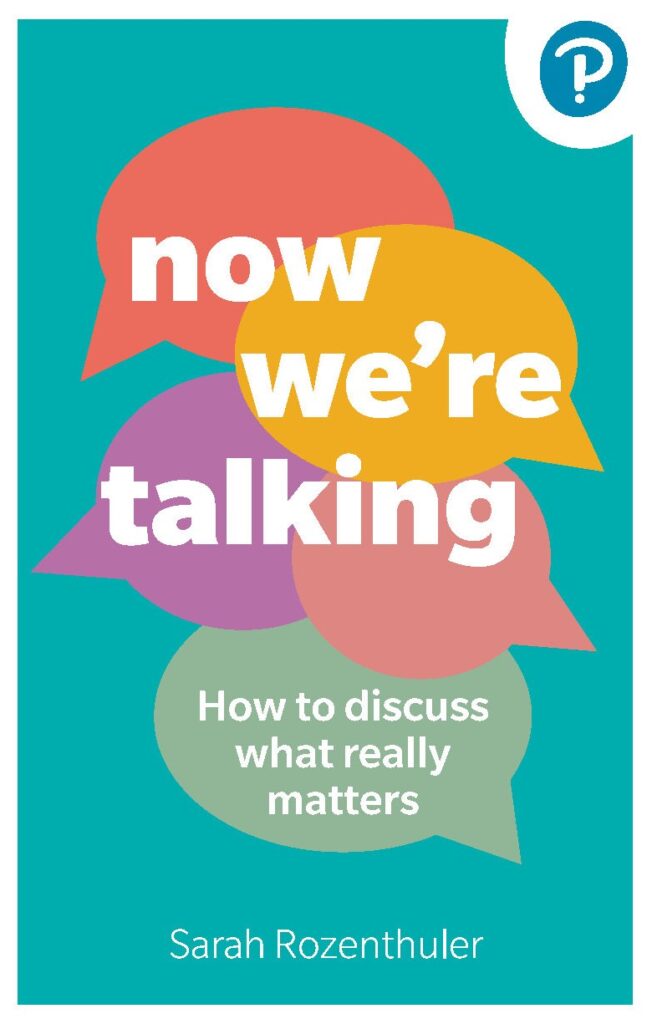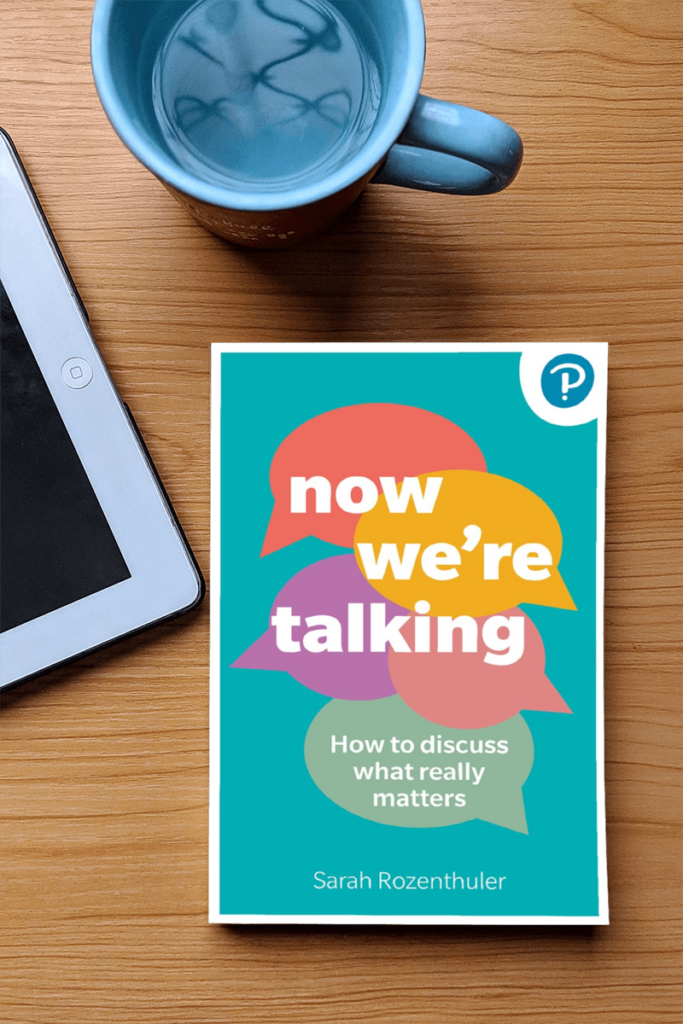How to discuss what really matters
Research says that 70% of managers avoid having difficult conversations.
This leads to poor decision-making, a cynical atmosphere that rots communication, and people competing rather than collaborating.
Avoiding difficult conversations saps our energy, keeps us feeling stuck and blocks positive outcomes.
Now We’re Talking, the latest book by Sarah Rozenthuler, aims to overcome the obstacles that stop you from having a difficult conversation and use ‘authentic dialogue’ tools so you can move from avoidance or breakdown to breakthrough.
You will learn how to:
- Use the Four Secrets so you can better tackle the conversations you dread most
- ‘Find your ground’ and prepare to have a difficult conversation
- ‘Build a bridge’ and create rapport
- ‘Read the room’ and intervene effectively
- ‘Hold space’ and navigate conflict
Discover how to apply cutting-edge tools so people talk about key issues, strengthen their relationships and uncover the hidden possibilities in difficult situations.
WATCH
Sarah Rozenthuler discusses ‘Now We’re Talking’ at the Think Global People Awards 2024
In her new book, ‘Now We’re Talking,’ Sarah Rozenthuler tackles the issues around dialogue and how to conduct it more effectively. It offers insightful and practical advice to leaders and managers.
It explains how to communicate effectively across diverse audiences and demonstrates how difficult situations can be handled to produce more positive outcomes.
Video transcript
How to talk with one another is a timeless topic in many ways but at the moment there’s a lot of focus on the quality of dialogue in the public square and I think with global working as well how international teams talk with one another think together is also rising as a trend as well dialogue in hybrid.
In the context of hybrid working with diverse teams, I think has got another layer of complexity to it because you might have team members in very different geographies and time zones.
Make the most of in-person time
I’ve worked with teams where there’s an 11-hour time difference so It’s tricky to even pick up the phone and then when a team is together in person – whether that’s an international team or a team that’s got a hybrid working pattern, I think they really need to make the most of the in-person time and make sure they have a good dialogue.
Improve your confidence to have a difficult conversaation
That’s not guaranteed and there are tools that help but the I think the in-person time is particularly valuable these days A little preparation goes a long way when it comes around to a difficult conversation. What the research tells us is about 60% of managers or leaders would like to improve their confidence to have a difficult conversation.
About 70% of leaders and managers say they sometimes avoid having a difficult conversation which I think is really understandable. Some managers and leaders avoid it and then others I think plow right in without doing any preparation make a mess of it and then that reconfirms the perceptions of others that difficult conversations are sometimes just too difficult to have and it’s a shame because actually there are some tools and approaches that make a real difference to the quality of dialogue well in a team setting.
Set ground rules at the beginning
It really helps to have a few ground rules at the beginning so that might be for example roughly equal airtime between team members because some personalities some cultures are more extrovert, more chatty, and other people from certain cultural backgrounds might be more reserved so if you set an expectation early on that it’s going there’s going to be some conversational turn taking that can make a real difference.

I sometimes say to teams let’s just welcome any uncomfortable moments if they arise because sometimes when the tricky issues start to surface it’s not always comfortable but that means you’re actually starting
As the subtitle of the book says, you’re starting to discuss what really matters so discomfort can actually be a 1positive sign that you’re starting to talk about the real issues and if you can all just slow down and really deepen your listening and create a more reflective space then the whole team will benefit from that.
Any manager or leader I think, particularly those leading teams where there are sometimes difficult issues to discuss or if not difficult critical issues to discuss so for example the last chapter of the book is called ‘Conversations about purpose’ because people are increasingly wanting their work to be meaningful, to make a difference particularly amongst the younger generation Generation Z.
How to start difficult conversations
ut many managers and leaders don’t know how to start those conversations and so I think you can ask some simple questions like when have you felt proud to work for this organization or who’s a leader that inspires you as an easy way in to talking about purpose, talking about the positive impact that your team that your organization or that you might have as an individua.
I think there’s a natural human desire to want to make a difference.
I think there’s a flow of positive energy and if we can just remove some of the obstacles then actually work can be much more fulfilling for individuals teams can function better and organizations can generate sustainable competitive advantage for themselves so it’s a win-win-win potentially and it’s also casting the net wider in terms of who you think your stakeholders are so it’s not just your shareholders.
Shareholders are of course important but it’s your customers, it’s your local community. It could also include the families of the team members and the people who work for organization.
If you include a wider range of stakeholders in the conversation about the impact your organization is having that will also be beneficial
When the book was commissioned I actually turned it down because I’d written a couple of other books and i touched on the subject of dialogue before but not so much dialogue in a team setting or an international setting.
There’s a lot we don’t understand about how to talk to one another
It was only when I took a holiday and relaxed and went for some coastal walks in Cornwall that I thought actually there’s a lot we don’t understand about how to talk with one another.
The war in Ukraine was just starting and so I went back to the commissioning editor and accepted the assignment to write the book and learned a lot along the way and I’m still learning a lot about this art of how we talk and think together.

Reviews of ‘Now We’re Talking’
Read what business leaders and senior management have to say about the latest book ‘Now We’re Talking.’
The heart of transformation
“Having the right conversation is at the heart of transformation. Sarah’s book shows how to do this, with practical examples that leaders can adopt. This gives new ways to relate to employees and run executive and board meetings.”
Dr Andrew White, Senior Fellow in Management Practice, Saïd Business School, University of Oxford, CEO of Transcend Space and 2050 Leadership Podcast Host
Expand your ability
“Read this book if you want to expand your ability to have the important or difficult conversations – whether with yourself, in your private life or at work. A skill so important right now and none better to lead us to success than Sarah!”
Alexander Hiller, Managing Director, Russell Reynolds Associates
A must read for those focused on the power of purpose and what matters most
“Cultivating the right mindset for engaging in authentic dialogue is essential for effective leadership in today’s complex and dynamic world. In an age of profound ‘polycrisis’, Now We’re Talking is a must read for those truly focused on the power of purpose and what matters most.”
David Hartman, Ambassador of Canada to the Philippines

An inspiration and tonic
“Much of my work consists of enabling conversation, often challenging conversation, among senior leaders in the church. This book is both inspiration and tonic – full of ideas which I hope to imitate and adapt, while at the same time nailing and calming the fears which could otherwise derail. Thank you, Sarah!”
The Rt Revd Dr Jo Bailey Wells, Bishop for Episcopal Ministry in the Anglican Communion and Deputy Secretary General
Ideal for leadership and management
“JFK once said ‘leadership and learning are indispensable to each other’– this book provides the ideal basis for those in leadership and management positions to reflect on what more they can do to develop their skills, become an active listener and learn how to effect positive change.”
Professor Sir Anton Muscatelli, Principal and Vice-Chancellor, University of Glasgow.
A wonderful toolkit for tackling difficult conversations
“Now We’re Talking builds your understanding and grows your skillset with its step-by-step process to having richer, more connected conversations.
A wonderful toolkit for tackling those difficult conversations – with your boss, employees, family or in your personal relationships – with confidence.”
Niamh Dowling, Principal and CEO, RADA
Eminently practical and beautifully researched
“Eminently practical, this beautifully researched, accessible book is an absolute must for any leader wanting to handle difficult conversations with greater care and skill. The tools shared here are easy to follow and have the potential to be real game-changers for those wise enough to try them out.”
Paul Williamson, Group Head of Talent Development, Ambassador Theatre Group
